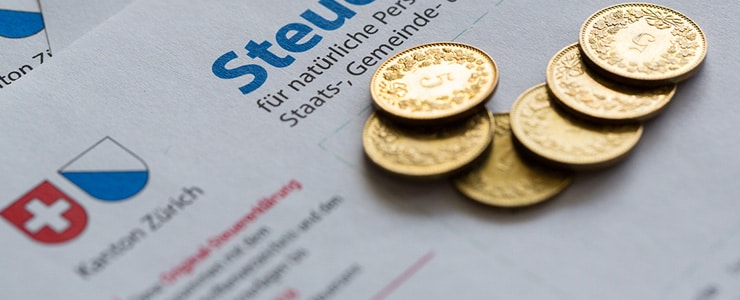The Confederation receives an advance tax on income from movable capital. This tax is imposed at the source on different types of income defined by the law. In fact, the receipt thereof is both a guarantee as well as a way to encourage taxpayers to file and correctly enter income subject to the advance tax in their books.
The advance tax is particularly imposed on dividends paid by a Swiss joint stock company to its parent company. A Swiss company that pays out the dividend is required to deduct the advance tax from the dividend and pay this tax to the Tax Administration (hereinafter, “AFC”). The beneficiary parent company receiving the dividend receives a net dividend and thus bears the tax expense.
In general, the advance tax may be recovered in national reports (i.e. a Swiss entity held by another Swiss company) if it is properly entered in the books and declared. However, the advance tax is a definitive expense if the parent company is established abroad. Nonetheless, in application of double tax agreements signed between Switzerland and the partner States, a full or partial rebate may be received for any advance tax paid. In any case, certain conditions must be fulfilled as defined in said agreements (the withholding percentage, the number of years withheld as well as the substance of the parent company abroad, for example).
Thus, it is important to ask in advance about the application of the filing procedure for international reporting. The filing procedure is also important upon the liquidation of a Swiss company held by a foreign parent company. In fact, surplus distributions are subject to advance tax. Please note that surplus distribution means all earnings-based distributions to the shareholders of the dissolved company. The reimbursement of the nominal capital as well as the capital contribution reserves are not considered part of the surplus distribution.
In practice, the filing procedure consists of a pre-authorisation request via three forms (823/823B/823C). This request must be submitted to the AFC which – after verifying the conditions required – will approve the authorisation.
The filing procedure is thus an advance request for the application of the withholdings rebate. This rebate is, in principle, provided for by the agreement in effect signed between Switzerland and the parent company’s State of residency (or in application of the agreement between the Swiss Confederation and the European Union for the automatic exchange of financial account information).
There are many advantages to this procedure. The filing procedure makes it possible to avoid the payment of a 35% advance tax and then request reimbursement for the difference between the tax paid and the residual provided for by the double tax agreement. This difference is returned to the taxpaying company (if all conditions are fulfilled) without any interest. Moreover, in terms of treasury, the company requesting the filing procedure in advance only has to pay the advance tax residual established in the Agreement. The company does not have to pay any sum higher than the tax due and, therefore, the company can streamline its treasury management.
Be careful with the theory of old reserves:
Implementing the theory of old reserves involves a major risk for Swiss capital companies held by foreign parent companies. We shall outline the classical situation where this theory applies.
The problem is when a Swiss company assigns its participation rights to a company that resides in a State with a more favourable conventional regime. In other words, if the Agreement with the State of residence of the assigning parent company provides for a tax residual that is higher than the one established in the Agreement with the State of residence of the new company holding the participation rights, the AFC fixes a sum of distributable reserves called “old reserves”. The sum of the old reserves corresponds to the smallest of the following: (1) non-operating assets (2) commercially distributable reserves. As concerns advance tax, the AFC hypothetically applies the regime provided for by the Agreement with the country of residence of the parent company holding the participation rights and not the regime provided for in the Agreement with the new State of residence of the new parent company.
For example, a Swiss company X SA which is held by company A, a resident of country A. The agreement between Switzerland and State A provides for a 10% advance tax residual. X SA assigns its participation rights to company B, a resident of State B, which provides for an advance tax residual of 5%. In such case, an old reserve sum is fixed by the AFC which withholds 10% of the sum stopped -upon future distributions.
Our team is available for more information on this matter.
Get a free assesment
Our team of best tax and legal experts, lawyers, accountants and financial advisors answer your question and assist you in achieving your goals




